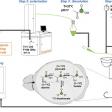(Los Angeles) August 15, 2017 - Professor Myriam Chaumeil is one of the 17 researchers that have been selected to receive the prestigious Marilyn Hilton Award for Innovation in Multiple Sclerosis (MS) Research by The Conrad N. Hilton Foundation.
The purpose of the award is to stimulate innovative and potentially paradigm-shifting research on progressive Multiple Sclerosis, which may otherwise go unfunded in times of fiscal restraint. The award, which is given in two categories – Bridging Award for Physician-Scientists and the Pilot Innovator Award – is awarded to 17 recipients, totaling almost $4 million in grants over a five-year period. Grant recipients will study topics ranging from mechanisms behind myelination and demyelination, to the use of advanced imaging techniques, and processes behind the causes of inflammation.
Following is a list of the 13 recipients of the Pilot Innovator Award, aimed at stimulating paradigm-shifting research into progressive Multiple Sclerosis. Young scientists at an early stage of their careers often have the greatest potential for innovation, but often the least resources. The Pilot Innovator Award grants are designed to be small and short, allowing the investigators time and resources to show proof of concept, thus allowing them to gain enough data to apply for larger grants from the National Institutes for Health or the National MS Society. Each of the below recipients will receive $120,000 in funding.
- Dr. Drew Adams, Case Western Reserve University, to study the unifying mechanisms all remyelinating molecules have in common and to share findings with the field of MS research.
- Dr. Pavan Bhargava, Johns Hopkins University, to identify new biomarkers of inflammation and neurodegeneration using the plasma of patients with MS
- Dr. Myriam Chaumeil, University of California, San Francisco, to develop an innovative neuroimaging method that will detect oxidative stress in patients with MS.
- Dr. Alessandro Didonna, University of California, San Francisco, to study misfolded tau aggregates found in the brains of MS patients.
- Dr. Valentina Fossati, New York Stem Cell Foundation, Inc., to study the properties of oligodendrocyte progenitor cells in MS.
- Dr. Ari Green, University of California, San Francisco, to support a retinal method study of innate immune activation in MS, with a goal of advancing targeted therapeutic approaches.
- Dr. Susie Huang, Massachusetts General Hospital, to develop imaging markers of axonal damage and myelin integrity in MS patients using ultra-high gradient MRI techniques.
- Dr. Ethan Hughes, The University of Colorado, to study mechanisms regulating MS-related myelin injury and repair in cortical lesions.
- Dr. Eve Kelland, University of Southern California, to study the potential of angiotensin 1-7 to promote oligodendrocyte progenitor cell remyelination.
- Dr. Hyun Kyoung Lee, Baylor College of Medicine, study how targeting the Wnt receptor complex may increase myelin repair in MS patients.
- Laura Piccio, Washington University, to identify biomarkers in cerebrospinal fluid that may predict MS disease progression and responses to therapy.
- Dr. Seth Smith, Vanderbuilt University Medical Center, to apply advanced imaging to the study of the cervical spinal cord in patients with MS.
- Michael Sy, The University of California, Irvine, to study whether lower GlcNAc levels promote the progression of MS by preventing oligodendrocyte formation and reducing remyelination.
Find out more in the full press release.




